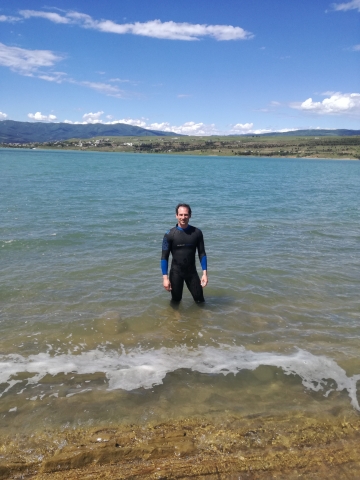INTERVIEW The Alcatraz Federal Penitentiary on Alcatraz Island was a maximum high-security federal prison 1.25 miles (some 2km) off the coast of San Francisco, California, which operated from 1934 to 1963. During its time it housed around 1,500 of America's most ruthless criminals, including Al Capone, Robert Franklin Stroud (the "Birdman of Alcatraz"), George "Machine Gun" Kelly, Bumpy Johnson, and Alvin "Creepy" Karpis (who served more time at Alcatraz than any other inmate). A total of 36 prisoners made 14 escape attempts during the 29 years of the prison's existence, the most infamous of which were the violent attempt of 1946 known as the "Battle of Alcatraz", and the arguably successful "Escape from Alcatraz" by Frank Morris, John Anglin, and Clarence Anglin in 1962- said to have been one of the most detailed escapes ever thought up. Faced with high maintenance costs and a bad reputation, Alcatraz closed in 1963.
You may wonder what any of this has to do with Georgia. Well, one British man is planning to swim the cold, shark-infested waters in a race for a good cause. Robin Forestier-Walker, who has been reporting for Al Jazeera English from Europe and Central Asia since 2008, has been training to swim the 2km stretch of water from Alcatraz to the mainland in order to raise money towards improving mental health services, in particular for people suffering from mental disorders, such as schizophrenia, in Georgia.
"I’m asking people to consider making a donation via the generosity.com website. So far, we’ve raised about $4000, and I’m really excited. There are some good charities here working in mental health and a little can go a long way."
GEORGIA TODAY spoke to Robin to find out more.
What was the inspiration behind the swim?
My American cousin’s son, Jack Rohman, tragically took his own life six years ago. He was suffering from schizophrenia. His father Keith found solace in swimming and he and I discovered a mutual love of open-water distance swimming. When Keith proposed Alcatraz, I said let’s do it for charity. Keith has since raised almost $20,0000 for mental health in the US which is a fabulous result. I looked into what was available here in Georgia for people suffering from psychiatric disorders, and I found that there wasn’t much. I learned that state mental healthcare services are chronically underfunded, especially for some of the most vulnerable age groups such as adolescents. There’s a shortage of specialist units and psychiatrists and limited community-based services. People suffering from mental health problems face stigma and discrimination in society. So it seemed obvious that I should try to fundraise for mental healthcare in Georgia.
Why Alcatraz?
Alcatraz is the infamous now decommissioned prison in the US which sits around 2.5km off shore in San Francisco Bay. No escapees are known to have survived the swim, so it has a reputation for being quite a challenge. But hundreds of swimmers make the journey every year. Keith has already swum it and tells me it’s a fantastic experience, and that I shouldn’t worry about the sharks!
What (and how much) preparation is needed?
You have to be a confident swimmer, work on your technique, and feel at home in the water over distances. That takes practice. I’ve been swimming 3 or 4 times a week this past month in a local pool and I’ve also been swimming in Tbilisi Sea. It’s really clean and beautiful up there. It’s also still quite cold, and when the wind gets up the water is choppy - all good practice because these are the conditions I can expect in San Francisco Bay.
What are the risks involved?
Apparently, there are sharks but they are nothing to worry about. Foggy conditions, however, will make it more difficult to sight the shoreline (you have to aim slightly off course to take into account the tidal currents). Also, the water will be quite cold, but I have a wetsuit, even though open water purists say one should swim ‘au naturel,' and I mean in a swimming costume, not naked…
Have you sought advice from anyone (doctors, professional swimmers, Alcatraz escapees, etc.) in order to better prepare?
I’ve read a few blogs about the swim and I'll need to listen closely to what the race organizers say on the day. I also use a really good swim training website for tips on how to prepare.
What are the expected results?
I'll keep the fundraiser open for a few more weeks and will choose where to allocate later this year. There are NGOs doing great work here, including the Global Initiative on Psychiatry Tbilisi, the Georgian Association for Mental Health and other non-profits like GCRT and Maclean Georgia. The last two have generously shared their time with me about the problems and we're still in discussion about how to make a difference. We plan to talk to the Ministry of Health about what’s needed. One option is to try to pilot a new scheme such as a helpline or messaging service targeting young people, or some form of online resource with information to help them understand what’s happening and where they can go for help. Another option is to fund an awareness-raising project. It may also be that we donate the money to an initiative that is already up and running. I feel a great sense of responsibility taking this on, but I’m really looking forward to making the most of this opportunity when I’m back in Georgia later in the summer.
How does your family feel about it all?
My family are behind me of course! My mother tends to worry a lot but she knows this is what I enjoy doing.
Robin will be swiming Alcatraz this sunday, June 4. Wish him luck and support the cause! Click here to donate!
Katie Ruth Davies
01 June 2017 19:48












